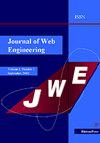完全分散的水平自动伸缩技术,用于雾计算中的突发负载
IF 1
4区 计算机科学
Q4 COMPUTER SCIENCE, SOFTWARE ENGINEERING
引用次数: 0
摘要
随着物联网设备数量的不断增加,云中的网络和处理延迟也随之增加。作为一种解决方案,雾计算应运而生,它将计算资源放在离用户更近的地方,以降低云中的通信开销和拥塞。在雾计算系统中,微服务以容器的形式部署,需要 Kubernetes 这样的协调工具来支持服务发现、部署和恢复。微服务协调中的一个关键挑战是在不可预测的突发负载情况下自动扩展微服务。在云计算中,集中式自动调节器可以监控已部署的微服务实例,并根据监控到的指标值采取扩展措施。然而,在雾计算中监控越来越多的微服务可能会造成过高的网络开销,从而延迟采取扩展行动的时间。我们提出了一种完全去中心化的自适应自动调节器--DESA,通过它,微服务实例可以做出自己的扩展决策,通过自我监控克隆或终止自己。我们在不同数量雾节点的模拟雾计算环境中对 DESA 进行了评估。此外,我们还利用1998年世界杯网站访问日志进行了案例研究,检验了DESA在现实场景中的性能。结果表明,与集中式方法相比,DESA 成功缩短了大规模雾计算系统中的扩展反应时间。此外,DESA 在负载突发时的最大实例数和平均 CPU 利用率也相差无几。本文章由计算机程序翻译,如有差异,请以英文原文为准。
Fully Decentralized Horizontal Autoscaling for Burst of Load in Fog Computing
With the increasing number of Web of Things devices, the network and processing delays in the cloud have also increased. As a solution, fog computing has emerged, placing computational resources closer to the user to lower the communication overhead and congestion in the cloud. In fog computing systems, microservices are deployed as containers, which require an orchestration tool like Kubernetes to support service discovery, placement, and recovery. A key challenge in the orchestration of microservices is automatically scaling the microservices in case of an unpredictable burst of load. In cloud computing, a centralized autoscaler can monitor the deployed microservice instances and make scaling actions based on the monitored metric values. However, monitoring an increasing number of microservices in fog computing can cause excessive network overhead and thereby delay the time to scaling action. We propose DESA, a fully DEcentralized Self-adaptive Autoscaler through which microservice instances make their own scaling decisions, cloning or terminating themselves through self-monitoring. We evaluate DESA in a simulated fog computing environment with different numbers of fog nodes. Furthermore, we conduct a case study with the 1998 World Cup website access log, examining DESA's performance in a realistic scenario. The results show that DESA successfully reduces the scaling reaction time in large-scale fog computing systems compared to the centralized approach. Moreover, DESA resulted in a similar maximum number of instances and lower average CPU utilization during bursts of load.
求助全文
通过发布文献求助,成功后即可免费获取论文全文。
去求助
来源期刊

Journal of Web Engineering
工程技术-计算机:理论方法
CiteScore
1.80
自引率
12.50%
发文量
62
审稿时长
9 months
期刊介绍:
The World Wide Web and its associated technologies have become a major implementation and delivery platform for a large variety of applications, ranging from simple institutional information Web sites to sophisticated supply-chain management systems, financial applications, e-government, distance learning, and entertainment, among others. Such applications, in addition to their intrinsic functionality, also exhibit the more complex behavior of distributed applications.
 求助内容:
求助内容: 应助结果提醒方式:
应助结果提醒方式:


